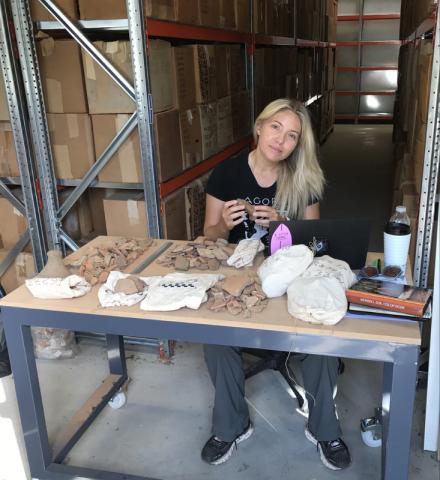Fotini
Fotini Kondyli (NEH Horace W. Goldsmith Distinguished Teaching Professor of Byzantine Art and Archaeology) is a Byzantine archaeologist who works on the Late Antique, Byzantine and Frankish periods (5th-15th c). Her research interests include spatial practices, community building processes and the material culture of Byzantine non-elites. She also works on cultural, economic, and political networks in the Eastern Mediterranean in the Late Byzantine period (13th- 15th c.). Her work brings together archaeology, archival research, spatial analysis, and the digital humanities. She is the author of Rural Communities in Late Byzantium, Resilience and Vulnerability in the Northern Aegean (2022) that argues for resilient island rural communities and seeks to reinstate non-elites in the historical narrative pointing to their ability to cope with environmental, demographic, and political crises and initiate changes that contributed to their survival and well-being. She is also the coeditor of The Byzantine Neighbourhood. Urban Space and Political Action (2022).
Specialties
As an active field archaeologist, Kondyli has worked in numerous archaeological sites in Greece, Albania, Turkey, the United Kingdom, and Germany. She is currently involved in archaeological projects at Athens, Thebes, northern Attica, and Samothrace. At Athens, she is working with legacy data from the Athenian Agora Excavations to explore processes of city-making and the role of different social groups in the development of Athens in the Middle and Late Byzantine/Frankish periods. She is also the director of the Inhabiting Byzantine Athens digital project. In collaboration with The Institute for Advanced Technology in the Humanities (IATH) and Scholars’ Lab at UVA, she is employing computational methods to identify and systematically extract information from the Athenian Agora Excavations’ archives pertaining to the Byzantine and Frankish periods. Such methods allow the project to inter-relate different types of information (artifacts, maps, notes) and integrate different media (text, images, 3D reconstructions, video etc.) that in turn support a detailed study, visualization, and interpretation of the excavation results. The project also deals with new solutions in dealing with legacy data that can be replicated and used by other archaeological projects that face similar challenges in making their archival collections more accessible.
She has held fellowships at the Dumbarton Oaks Research Library and Collection (Junior Fellow 2008-2009; Summer Fellow 2016) and at the Joukowsky Institute for Archaeology and the Old World at Brown University (2012-2014). She has also been the recipient of the American Institute for Archaeology Colburn Fellowship (2014-2015), an NEH research fellowship (2018) and she is currently named NEH Horace W. Goldsmith Distinguished Teaching Professor for 2021-23.
Kondyli offers courses on Late Antique and Byzantine art and material culture, on household archaeology, pre-modern urbanism and sacred landscapes as well as on cross-cultural artistic and economic interaction in the Medieval Mediterranean. She also takes students with her in the field and involve select students in her research.
